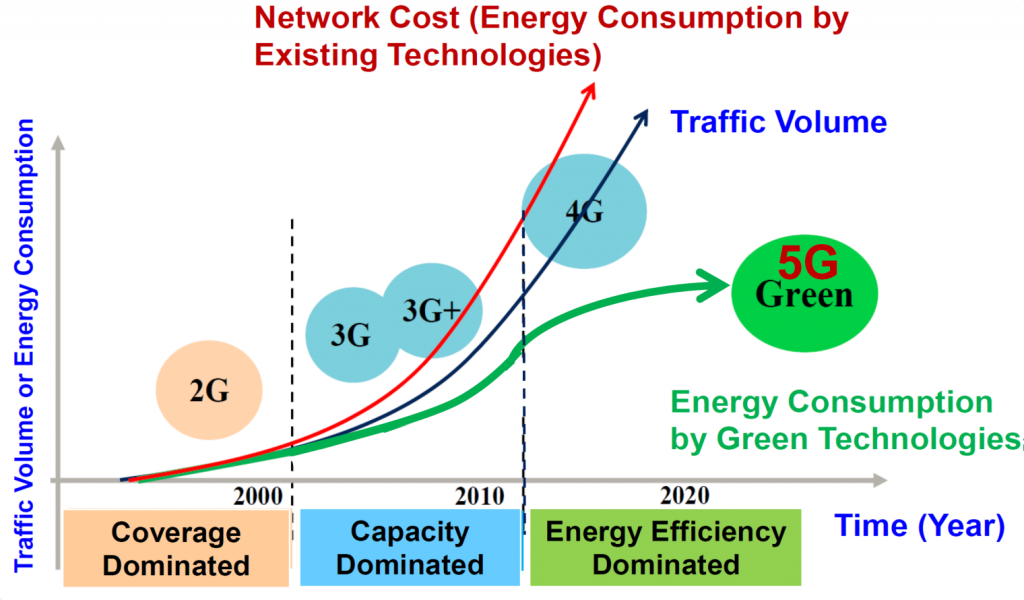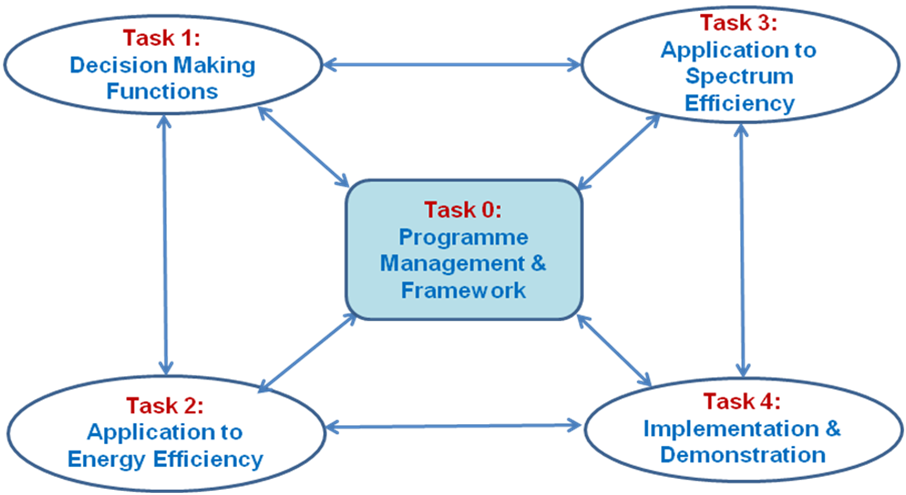UEB/CominLabs Chair Project (Chair of Excellence)
GREAT (Green Cognitive Radio for Energy-Aware wireless communication Technologies evolution) Project Summary
| Project title | GREAT (Green Cognitive Radio for Energy-Aware wireless communication Technologies evolution) |
| Work plan structure | The research program is organized into 4 main tasks: Task 1– Decision making functions; Task 2 – Application to energy efficiency; Task 3 – Application to spectrum efficiency; Task 4 – Implementation & demonstration |
| Project duration | 24 months (01/12/2012 – 30/11/2014) |
| Research area | New frontiers in future wireless communications and networking (Chair of Excellence) |
| Key words | Green radio, green communications, cognitive radio, cognitive networks, green cognitive radio, energy efficiency, energy consumption, spectrum efficiency, machine learning, reinforcement learning, decision making, adaptive waveform |
Recently, it has been pointed out that Cognitive Radio (CR) is a paradigm-shift enabling technology for realizing energy-efficient Green Radio. Basically, Cognitive Radio can be combined with Green Radio (GR) based on intelligence-enhanced functionalities, which is aiming at sustainable development and evolution of wireless communications for energy efficiency and takes it as a fundamental crucial constraint within the learning and decision making process of the holistic cognitive cycle. Therefore, Green Cognitive Radio is in line with the key philosophy and objective of designing and implementing future radio communications system, namely: “…we would like to decrease the electromagnetic level by sending the right signal in the right direction with the right power, only when it is necessary, for achieving the same QoS by taking advantage of advanced intelligence…”.
The basic goal of this research program is to define a novel framework and representative functionalities of energy-efficient Cognitive Radio solutions to enable greener future wireless communications with efficient and sustainable energy utilization. This program will address the relevant fundamental research challenges, which include the essentials of Green Cognitive Radio to solve the ever-increasing energy consumption problems, basic definition of energy-efficiency metrics for wireless communications to characterize the energy consumption behavior of a radio system, service-aware & energy-aware spectrum sensing, design of advanced spectrum-adaptive waveforms, design and implementation of low-power cooperative signal processing, cross-layer resources allocation as well as intelligent learning and decision making strategies to decrease equipment power consumption and to optimize spectrum utilization for achieving a balance of energy-spectrum efficiency.
Not so many years ago, sustainable development was only the preoccupation of ecological groups. However, sustainable development has become a globally paramount issue and an aspiration of long-term civilization development of all human beings since the “Resolution 42/187 of the United Nations General Assembly” in December 1987. The Brundtland Commission of the United Nations (UN) has defined sustainable development as the one that “meets the needs of the present without compromising the ability of future generations to meet their own needs“. From then on, several United Nations’ conferences (from Rio de Janeiro-1992 to Copenhague-2009) continually confirmed this important issue, for which one of the most obvious aspects and challenges of sustainable development is the earth climate change and the ever-growing CO2 emission.
Currently, 3.3% of the world-wide energy is consumed by the ICT (Information and Communications Technology) infrastructure, which causes about 2%-4% of the world-wide CO2 emissions and surprisingly is comparable to the world-wide CO2 emissions by all commercial airplanes. These values of carbon footprint are extreme impressive, which have been validated by a number of scientific studies and measurements around the world.
Moreover, the European Council has set forth a critical target as the “20 20 by 2020” initiative, which calls for a reduction of 20% in greenhouse gases (GHG) and a 20% share of renewable energies in EU energy consumption by 2020.
In support of reaching this strategic long-term goal, we will study and implement the intelligent Green Cognitive Radio approach to monitor the energy consumption of wireless systems, and to control the power switching (on/off) state and the adaptive reconfiguration of architectures and parameters that are related to power consumption and spectrum harmonization, of various wireless devices and sub-systems offering this capability.
Until now, on one hand, the industrial key players (telecommunication operators and equipment manufacturers) have been heavily studying various means and architectures for saving power and increasing energy-efficiency within the framework of on-going 3G and 4G telecommunication systems; on the other hand, Cognitive Radio approach for TV white spaces (TVWS) applications has also been commercially initiated recently. However, considering the future 5G telecommunication systems, there are global interests and ever-growing necessities to design completely novel architecture and framework and to pave the path for a disruptive enabling technologies when confronting the ever-serious challenge of the balance of spectrum- and energy-efficiency. Particularly, in the 5G era with millions more base stations and billions of connected devices, given the required 1000x increasing in offered data rates and throughput, the network energy efficiency should be improved at least by the same factor, in order to maintain the whole energy consumption at today’s level.
To date little significant work has ever been carried out on bringing Cognitive Radio and Green Radio together. Much of the Cognitive Radio activity has mainly focused on the assignment of the radio spectrum in the presence of primary users, especially in the TV bands, while completely ignoring the energy efficiency. Moreover, little has dealt with the use of distributed artificial intelligence (learning & decision making) to select spectrum for use, help reconfigure network topologies, and manage network-wide energy consumption. The Green Cognitive Radio approaches proposed here are significantly more adventurous in scope than those of the state-of-the-art. To our best knowledge, none of the industrial big players has ever been concretely involving in the research on Green Cognitive Radio, which is in its infancy and expresses a revolutionary potential and roadmap on how energy usage in future generations (5G) of broadband wireless networks can be significantly reduced through the use of intelligence to help manage network reconfiguration.
In summary, the main objective of this program is to establish a number of disruptive theoretical foundations and to realize some demonstrations as proof-of-concept, in order to validate the advantage, efficiency and feasibility of the proposed Green Cognitive Radio approach, for achieving the energy-spectrum harmonized era of future radio communications systems.
Table 2 GREAT Project Members
| Name | Position | Roles in GREAT Project |
| Jacques Palicot | Professor (Supélec) | All tasks |
| Honggang Zhang | UEB/CominLabs Chair Professor | All tasks |
| Sumit Darak | Post-Doc Research Fellow (UEB/CominLabs) | Task 1, 2, 3 |
| Hadi Noureddine | Post-Doc Research Fellow (UEB/CominLabs) | Task 2, 3, 4 |
| Malek Naoues | Post-Doc Research Fellow (UEB/CominLabs) | Tasks 2, 4 |
| Christophe Moy | Professor (Supélec) | Task 1, 2, 3, 4 |
| Yves Louet | Professor (Supélec) | Task 0, 2, 3, 4 |
| Daniel Le Guennec | Professor (Supélec) | Task 2, 3 |
| Carlos Faouzi Bader | A/Professor (Supélec) | Task 2, 3, 4 |
| Amor Nafkha | A/Professor (Supélec) | Task 4 |
Moreover, Prof. Zhifeng Zhao (Zhejiang University, China), Dr. Tao Chen (VTT Technical Research Centre of Finland, Oulu, Finland), Dr. Xianfu Chen (VTT Technical Research Centre of Finland, Oulu, Finland), Mr. Rongpeng Li (Zhejiang University, China), Mr. Xuan Zhou (Zhejiang University, China ), and Mr. Yifan Zhou (Zhejiang University, China) have been actively involving in this GREAT project, achieving a number of fruitful cooperation and publications.


